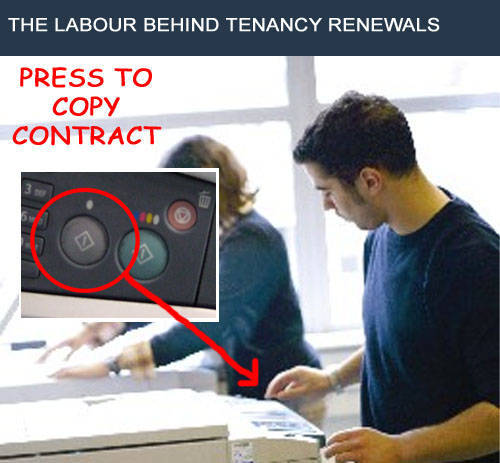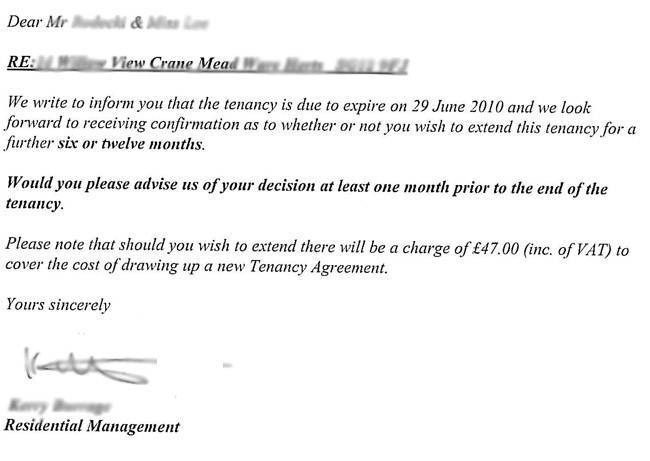Update: AWESOME NEWS!
On the 1st of June 2019 the “Tenant Fees Act 2019” came into force, which is a legislation that focuses on banning and restricting letting agents and private landlords from charging tenants in England with certain fees, which includes ‘tenancy renewal fees’ (and various other charges).
If on or after the 1st of June 2019 any tenant in England is charged with a tenancy renewal fee it will be deemed unlawful and punishable by hefty fines. For more details, please refer to the ‘Tenant Fees Act 2019’ blog post.
Unfortunately, if you’re a tenant outside of England, you may still be subject to tenancy renewal fees!

Quick reminder for why I believe Tenancy Renewal Fees are unfair
Yes, I’m a broken record, I’ve already said this crap so many times, but I’ll happily say it again!
Letting agents already make a pile of money from finding tenants and managing properties! They’re not providing any additional services when the same landlord retains the same tenant after the fixed term has expired.
However, in many cases, letting agents charge both landlord and tenant for renewing the tenancy agreement. Why? I don’t agree with the fee, but if they’re going to charge renewal fees, why charge both landlord and tenant?
Let’s not forget, the labour behind a tenancy renewal…

How tenants can avoid ‘Tenancy Renewal Fees’
As said, if you’re a tenant in England, you don’t need to worry, because as of the 1st of June 2019, it is illegal for landlords and letting agents to charge tenants with renewal fees. For everyone else…
So, this is a real case scenerio that recently happened.
My friend’s Tenancy Agreement is approaching the end of the fixed term, but fortunately both he and the landlord are happy for the tenancy to continue as is.
The landlord uses a letting agent to manage the property, so for the tenancy to continue, the agent wanted a new tenancy agreement drafted and signed, in exchange for a hefty fee (i.e. the tenancy renewal fee). Many agents charge both landlord and tenant in excesss of £120 each for that privilege. What a joke.
Anyways, my friend received this letter from the landlord’s agent…

He asked me if there was anyway he could avoid this fee because he, rightly so, thought it was unjustified. I told him to send them the following email, and see what happens (I was probably more curious than he was):
To [insert agent’s name],
I’m writing to you in regards to the renewal of the tenancy for the property [insert property address].
Fortunately, I don’t need any of the terms and conditions in the existing tenancy agreement to change, so I’m happy for the tenancy to become periodic, therefore avoiding any additional admin work.
I’m happy to discuss this directly with the landlord if there are any problems with this arrangement.
Kind regards
As the email clarifies, if the tenancy becomes periodic, there’s no extra work required, consequently the agency can’t enforce an admin fees (which is typically how they justify the renewal fee). It was also important to specify that my friend is happy to discuss the situation with the landlord.
The agents responded with something like this:
Hey [insert tenant name],
We’ve discussed this with the Landlord and he is happy for the tenancy become periodic.
Kind regards,
Agent.
Fair play to the agents, they were rather accomodating, something I’m not sure all agents would have been. However, I can’t see how any agent could charge a renewal fee if zero work is required for the tenancy to continue.
Yeah, so that’s how it all went down.
A quick reminder of what a periodic tenancy is…
At the end of the fixed term the tenancy agreement is not terminated or renewed, it automatically becomes what is known as a Statutory Periodic Tenancy. All the terms and conditions of the original tenancy agreement still apply, but the tenancy continues on a month-by-month rolling contract (assuming the rent is paid on a monthly basis, which it almost always is).
But, remember…
Some landlords won’t be happy with the idea of a tenancy becoming periodic, which is completely understandable. Many landlords would prefer securing long-term agreements (although I’m not one of them, because I believe short-term tenancies rule!), so this solution may not always be supported and approved by the landlord.
Tenants may also want a more long-term arrangement secured on paper, so they can’t be unexpectedly asked to vacate the property. But the advantages of a periodic tenancy is that it offers more flexibility to both landlord and tenant. And if both tenant and landlord are both happy with the agreement, there’s no reason why a periodic agreement couldn’t last for years. The odds are that if the landlord and tenant want the tenancy agreement to continue, they’re both happy with one another anyways.
Not all agents charge renewal fees
There are agents oput there that don’t charge tenancy renewal fees, and that’s a clear sign of a good letting agent, in my opinion.
Some agents are even willing to drop the renewal fee in order to get your custom, but you’ll probably need to haggle. But remember, if you manage to swing the deal, make sure you get it confirmed in writing – that they have agreed to waive renewal fees.
If your letting agent does charge a tenancy renewal fee, they MUST…
When using a letting agent, you’re usually required to sign a contract with them. In the contract, there should be a clause which refers to the details of the renewal fees if it’s a fee they charge.
If the tenancy renewal fee is NOT in the contract, or clearly stated in the contract, then it’s unlikely they will be able to legally enforce the fee if you challenge it.
In 2009, the high profile estate agency Foxtons were been told by the High Court that some of the charges they impose on landlords are unfair, because the fees were tucked away in the small-print, and therefore they were classed as a “trap”
The court ruling sent out a clear message, saying that fees should not be hidden away in the small-print, and they should be written in “plain and intelligible” language.
Disclaimer: I'm just a landlord blogger; I'm 100% not qualified to give legal or financial advice. I'm a doofus. Any information I share is my unqualified opinion, and should never be construed as professional legal or financial advice. You should definitely get advice from a qualified professional for any legal or financial matters. For more information, please read my full disclaimer.


 Landlord Products / Services
Landlord Products / Services




























@Kirsty
In theory, they could just increase the rent with a Section 13 notice- that's not a new tenancy, just a rent increase note.